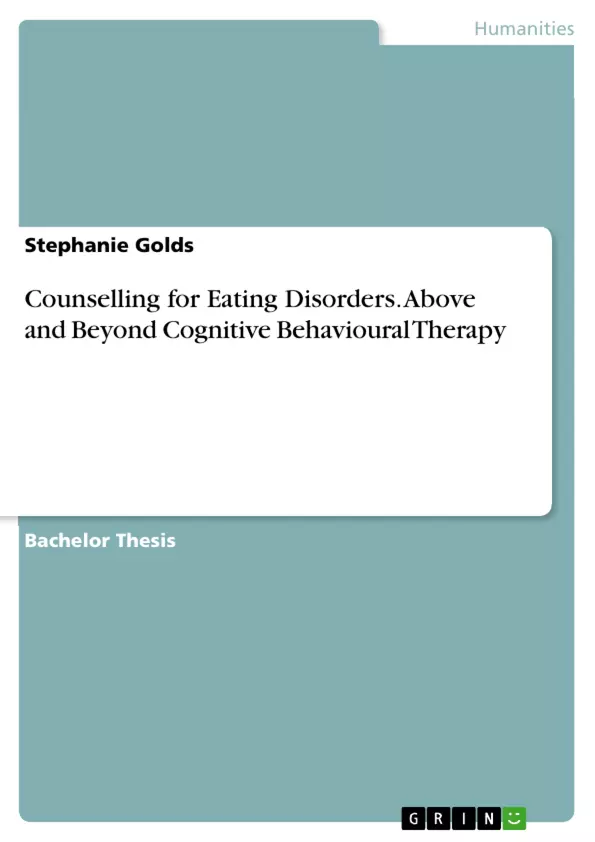Western culture today favours masculine, linear, and strategic opportunities, approaches, and answers, in many aspects of life, leaving little room for guided intuition, spiritual vision, or feminine energy. It is from personal experience, through therapy, conversation. education, and conducting research, that it became quite clear that this linear, strategic approach is also favoured in the treatment of eating disorders; a phenomenon that is without doubt multi-faceted and multi-dimensional.
The counselling approach that is most-favoured and most-documented for the treatment of eating disorders, is cognitive behavioural therapy (CBT). CBT incorporates tasks, strategies, and exercises in order to obtain results, leaving aside the more abstract, intuitive techniques. It is the opinion of the author that while CBT has proven to be successful in treating eating disordered thoughts and behaviours, it falls short. As beings, we are much more than the sum of our actions and so, counselling needs to incorporate other elements above and beyond CBT techniques if true change is to occur.
The body of the thesis will contain three main chapters which will provide (1) an overview of elements for consideration with regard to eating disorders, (2) a detailed description of a number of treatment paradigms for eating disorders; and (3) the missing puzzle pieces that could compliment the CBT approach for a more successful outcome. The purpose of this overview is to provide a greater understanding of eating disorders and how they might be better treated in the counselling setting.
Inhaltsverzeichnis (Table of Contents)
- Acknowledgements
- Introduction
- Chapter 1 An Overview of the Disorder
- The development of an eating disorder
- Is it, or is it not, about food?
- The anorexic voice
- Chapter 2 – Therapeutic Approaches
- Cognitive behavioural therapy
- Schema therapy
- 6 reflections
- Chapter 3 - Elements for Consideration
- A Jungian perspective
- Culture
- Therapeutic alliance
- Conclusion
- References
Zielsetzung und Themenschwerpunkte (Objectives and Key Themes)
This thesis aims to provide a comprehensive overview of eating disorders and explore treatment approaches beyond traditional cognitive behavioural therapy (CBT). It aims to highlight the multi-faceted nature of the disorder and emphasize the importance of incorporating alternative perspectives and techniques into treatment.
- The limitations of CBT in treating eating disorders
- The importance of considering the cultural and societal influences on eating disorders
- The role of the therapeutic alliance in the treatment of eating disorders
- The potential of Jungian perspectives and other complementary therapies in addressing the underlying issues associated with eating disorders
- The need for a more holistic and individualized approach to treatment that acknowledges the complexity of eating disorders
Zusammenfassung der Kapitel (Chapter Summaries)
Chapter 1 offers a broad overview of eating disorders, discussing their development and the various factors that contribute to their emergence. This chapter aims to provide a nuanced understanding of the disorder, moving beyond simplistic views of it as solely a food-related issue. It delves into the "anorexic voice," a powerful internalized voice that often drives the behaviors and thoughts associated with anorexia nervosa.
Chapter 2 presents a detailed analysis of different therapeutic approaches for treating eating disorders. It focuses on cognitive behavioral therapy (CBT), a widely used approach, and explores other paradigms like schema therapy. This chapter critically examines the effectiveness of these methods and explores their limitations in addressing the complex needs of individuals with eating disorders.
Schlüsselwörter (Keywords)
The main keywords and focus topics of this thesis are eating disorders, cognitive behavioral therapy, schema therapy, Jungian psychology, therapeutic alliance, cultural influences, and the multi-dimensional nature of eating disorders. The thesis explores the limitations of traditional treatment approaches and proposes a more holistic and personalized approach that considers the individual's unique experiences and perspectives.
Frequently Asked Questions
What are the limitations of Cognitive Behavioural Therapy (CBT) for eating disorders?
While successful for managing thoughts and behaviors, CBT is often criticized for being too linear and strategic, potentially ignoring abstract, intuitive, and underlying emotional aspects.
What is the "anorexic voice"?
It is a powerful internalized voice that drives the self-destructive thoughts and behaviors associated with anorexia nervosa, often analyzed in the early stages of therapy.
How does a Jungian perspective contribute to treatment?
A Jungian approach looks at the deeper symbolic and archetypal meanings behind the disorder, incorporating spiritual and feminine energies often neglected in strategic therapy.
Why is the therapeutic alliance important?
The relationship between the counsellor and the client is considered a crucial factor for a successful outcome, providing the trust needed for deep psychological change.
What role does culture play in eating disorders?
Western culture’s emphasis on linear, masculine approaches and specific beauty standards is seen as a significant external factor in the development and treatment of these disorders.
- Quote paper
- Stephanie Golds (Author), 2017, Counselling for Eating Disorders. Above and Beyond Cognitive Behavioural Therapy, Munich, GRIN Verlag, https://www.grin.com/document/381045



